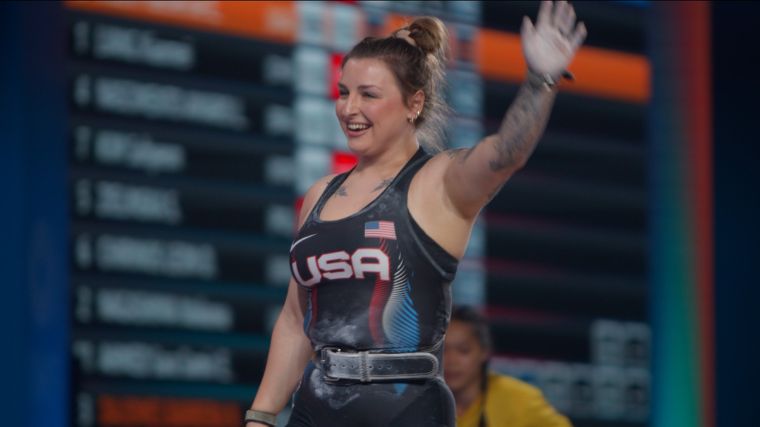Ever since she won a medal at the 2020 Olympics, Kate Vibert has been embroiled in a beef with the Transportation Security Administration.
“[The medal] almost always gets flagged when I’m going through airport security,” Vibert tells BarBend, chuffed at the chance to vent about it. “It shows up as a large, dark circle on their scanners.” Like one of those Looney Tunes bombs that Wile E. Coyote was infatuated with, or maybe a palm-sized black hole.
Vibert is a professional weightlifter whose rapid ascent in the sport began when she took up the barbell in 2016. Five years later, she won a silver medal in the Women’s 76-kilogram event at the Tokyo Olympics in 2021. At the time, it was only the fourth ever earned by an American woman at a Games event.
We’ve all been there — sweaty and anxious in the TSA security line, not on the Olympic podium — waiting to see if the agents will dismantle our carefully-packed luggage to investigate a tube of toothpaste in the name of national security or whatever. For Vibert, extra time in the TSA line is just something she’s learned to expect.
The Winner’s Circle
At weightlifting competitions (called meets by insiders), athletes are awarded their medals only a few minutes after they finish competing. Particles of chalk dust the lifting platform like powdered sugar, and then are hurriedly broomed off as attendants construct a three-tier podium for the athletes.
Vibert recounts taking two teary-eyed steps up to the second-place podium in Tokyo, where she donned her medal herself. In addition to a slew of other COVID-19 restrictions (Vibert says daily testing and full-time masking were the norm in the Olympic Village), protocol prevented officials from adorning the medalists.

There are, of course, photo ops at the closure of any Olympic event. Ravenous photographers coil around the medalists snapping picture after picture. Vibert is no stranger to popularity — she won the World Weightlifting Championships in 2019, only three years into her career — but an Olympic medal hangs differently.
- “I remember it being uncomfortable to wear,” she recalls.
To the Gram: After placing it on her bathroom scale at home, Vibert noted that her medal weighs around 550 grams, or just over a pound.
On the Road
Afterward, and with her hands still carved raw from the barbell’s knurling, Vibert wrapped the medal’s necklace around it and wedged it snugly into her backpack. It wasn’t until she returned home to Michigan weeks later — Team USA’s weightlifters celebrated their Tokyo campaign with a pit-stop vacation in Hawaii — that she actually received a box for the medal in the mail.
- “They sent me a special wooden box with a magnetic lid,” says Vibert. “I try to keep it tucked away, but when I travel with it, I bring the whole thing.”
In the months following her Olympic performance, Vibert embarked on a robust and nationwide seminar tour, teaching aspirant weightlifters the nuts and bolts of barbell wizardry. The medal always goes with.
[Related: Best Weightlifting Shoes for Beginners]
After she litigates with the TSA, Vibert is typically stopped again in the concourse; more often if she wears her Team USA jacket.
- “People recognize me from social media, or they ask what sport I’m involved with,” Vibert remarks. “I love hearing about their own journeys.”
She is, of course, prompted to unbox her medal here and there. “The first thing people say when they hold it is, ‘wow, it’s so heavy,” Vibert jokes.
It’s All Relative: Professional weightlifters are uniquely attuned to the idea of heavy. Her silver medal may weigh about half as much as a run-of-the-mill DSLR camera, but Vibert — who weighs 165 pounds — won it by lifting 304 pounds over her head.
When she’s not lugging her medal through airport security or conducting weightlifting seminars, Vibert spends much of her post-Olympics career at home with her husband and two German shepherds, Theo and Dani. Home offers a much-needed reprieve from being the (probably) most famous person at Delta gate B-14.
But don’t get her wrong — tangling with the TSA or falling into the same conversation with different strangers wears on Vibert a little, but she wouldn’t trade it for the world.
“Winning an Olympic medal was the pinnacle of my career,” she says. It may strain her neck from time to time, but a silver medal is worth its weight in gold.
More Olympics Content on BarBend
- These Are the Olympic Records in Weightlifting…for Now
- Why Can’t North Korea Compete in the 2024 Olympics in Weightlifting?
- Interview: 2024 Olympian Olivia Reeves on Being the Gold-Medal Favorite at the Olympics
Featured Image: @katevibert / Instagram